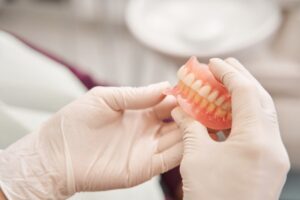
Tooth loss can be more than just a cosmetic issue – it has long-term effects on oral health, including bone loss in the jaw. Many people turn to dentures to restore their smile and improve function. But an important question remains: Can dentures prevent bone loss? In short, no, traditional dentures cannot prevent bone loss, but there are alternatives that can help.
Understanding Bone Loss After Tooth Loss
When you lose a tooth, the jawbone underneath no longer receives the stimulation it needs from chewing and biting. This stimulation is essential for maintaining bone density and volume. Without it, the bone begins to shrink in a process known as resorption. Over time, this can lead to noticeable facial changes, difficulty speaking or eating, and a poor fit for dentures.
Why Traditional Dentures Fall Short
Traditional full or partial dentures rest on the gums and do not interact directly with the jawbone. While they restore some function and appearance, they do not provide the necessary stimulation to preserve bone. In fact, as bone loss progresses, dentures can become loose and uncomfortable, requiring frequent adjustments or replacements.
Over the years, this can lead to:
- Jawbone deterioration.
- Changes in facial structure (sunken cheeks, aged appearance).
- Poor denture fit.
- Increased difficulty with chewing and speaking.
Dental Implants: A Better Alternative
The good news is that not all dentures are created equal. Dental implants are a tooth restoration procedure in which a titanium post is surgically placed in the jawbone with a crown attached to the top. These implants act like natural tooth roots and provide the stimulation needed to preserve bone density.
Because they are securely attached, implants offer several benefits:
- Help prevent bone loss by stimulating the jaw.
- Provide greater stability and comfort.
- Improve chewing efficiency.
- Reduce the need for adhesives.
- Preserve facial structure over time.
Dental implants are especially beneficial for patients who have experienced significant bone loss and want a more permanent, long-term solution.
Who Is a Good Candidate?
While implants are highly effective, not everyone is a candidate. Patients need to have sufficient bone density to support them from the start, although bone grafting may be an option for those with some loss. A bone graft involves taking healthy tissue from another part of the body or a comparable synthetic material and placing it into the jawbone. A comprehensive evaluation by a dental professional is necessary to determine the best treatment plan.
Traditional dentures can restore your smile and improve daily function, but they do not prevent jawbone loss. If you’re concerned about long-term bone health and stability, dental implants are a more effective solution. They not only look and feel more natural but also help maintain your facial structure and oral health for years to come.
About the Author
Dr. Nicholas Rowley has been treating local families for more than 10 years. He is a 2010 graduate of Nova Southeastern University and has taken hundreds of hours of continuing education. Today, he is a member of professional organizations like the American Dental Association and Florida Dental Association. If you’re interested in improving your smile and oral health with dental implants, you can rest assured that Dr. Rowley and our team will provide you with start-to-finish dental implant treatment with state-of-the-art technology in our modern office. Make your appointment today by calling our Melbourne office at (321) 723-1772 or by visiting our website.
